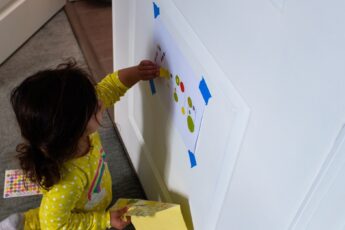Parents guide their children and help them navigate the world. Kids need assistance to grow their interests and various skills. Continue reading to find out how parents can help their children learn healthy habits from a young age.
A Balance of Screen Time and Activities
Many children play games on tablets, watch TV frequently, and use a smartphone from a young age, but some parents wonder if this technology usage will impact their children’s development.
Although technology is an excellent resource, it’s important to place value on experiences that stimulate the mind without the use of a screen. Parents should encourage kids to participate in activities such as reading, playing outside, and using toys designed to enhance learning. These activities will help kids develop more skills and have more memories rooted outside of the digital world.
Encourage Socialization
Family is the primary source of socialization for young children. Each family member can have a significant impact on the child’s development. While your child appreciates spending time with their parents, it’s essential to introduce your child to other family members. Branching out and communicating with others will improve their social skills as they mature.
School is a secondary source for children’s socialization. They talk with teachers and play with students their age. These interactions are also a fundamental piece of a child’s development. If your kids fight often or struggle with sharing, you should encourage more playtime with friends outside of school. Extra time spent socializing will enhance your child’s communication skills and ability to work with others outside of their family.
Model Eating Healthy Foods
Some children only want to eat chicken nuggets, fries, and candy for every meal. Unfortunately, many parents struggle to encourage kids to try other foods. If your kids are selective eaters, there are a few methods you can use to encourage your children’s excitement for healthier foods!
Firstly, you can try playing games and having conversations about the benefits of these healthy foods. You could also describe the importance of having fruits and vegetables on their plates. If your child struggles with drinking water, teach them about the health benefits of fruit-infused water and how it adds more flavor to the drink. You may also want to emphasize how to notice hunger and fullness cues.
The actions you take as a parent can also influence your child’s relationship with food. You can try to cook more meals at home or model what healthy eating looks like. As they get older, the information and memories will stick in their brains.
Support Positive Ways To Express Emotion
Children have strong emotions, but they may not know how to express them. They might cry and scream at the smallest inconvenience. Instead of punishing them, take your time and communicate. It’s up to the parents to help their children learn healthy habits when expressing their emotions.
The first step is to offer comfort and affection. Hugs and kind words are crucial for young children navigating their emotions.
Next, start to describe your own feelings. When you’re upset, discuss it. Modeling positive behavior will encourage your child to do the same. Your child will gradually learn how to understand their emotions in a better way while enhancing their communication skills.
Navigating this crazy world can be a challenge. Hope these tips will make things a little easier on this parenthood journey.








Leave a Reply